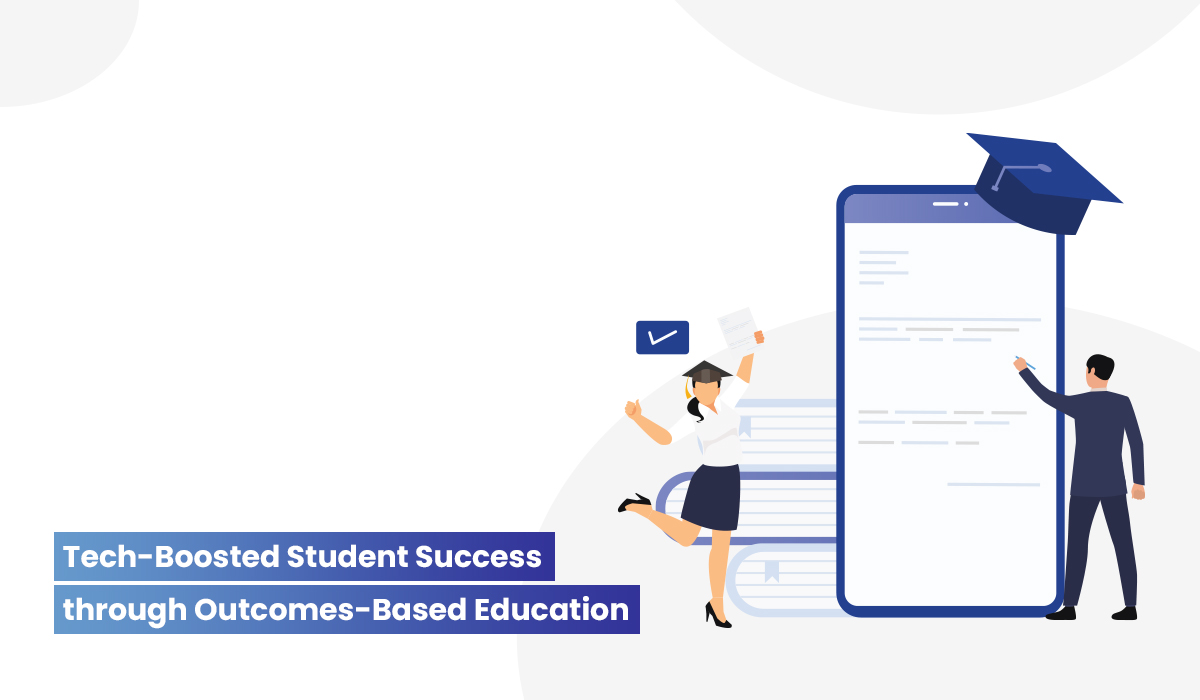How technology-enhanced outcome based education programs can improve student success
General
Outcome-based Education (OBE) has emerged as a guiding philosophy that emphasizes measurable student outcomes. Simultaneously, the integration of technology has become a cornerstone in shaping modern educational experiences. As we embark on this exploration, we delve into the synergy between Outcome Based Education and technology, unraveling the potential impact of this dynamic duo on student success. This blog seeks to provide insights into the symbiotic relationship between technology and OBE, delving into how their convergence can redefine the educational journey, paving the way for enhanced student success.
What is outcome based education?
Outcome Based Education (OBE) places students at the forefront, moving beyond traditional teaching to emphasize specific, measurable competencies. It revolves around explicit expectations, continuous improvement, and the seamless alignment of educational goals with real-world applications. The key components of OBE include defining learning outcomes, aligning assessments with these outcomes, and fostering a culture of continuous improvement. The goals are centered on producing graduates who not only possess knowledge but can apply it effectively, ensuring their readiness for professional challenges.
Importance of Student Success
Beyond traditional metrics, the importance of student success lies in nurturing individuals who not only accumulate knowledge but also adeptly apply it in real-world scenarios. This emphasis on practical application transforms students into agile thinkers, ready to navigate the complexities of life with resilience and competence. OBE does this.
Outcome Based Education (OBE) is a catalyst for student success, reshaping traditional education models by emphasizing practical application and real-world skills. Through personalized learning pathways, measurable outcomes, and continuous improvement, OBE ensures that students not only acquire knowledge but also develop the skills needed for today's dynamic job market. This approach aligns educational objectives with career readiness, fostering holistic development and creating agile thinkers prepared for the complexities of life.
How OBE is different from other learning models
Higher education is undergoing a radical transformation worldwide. A dramatic overhaul of programs, and regulatory framework, combined with the onset of disruptive digital technologies, has triggered significant changes in managing courses and curriculum, class schedule, instruction delivery, graduate attributes, assessment methods, and feedback system towards the attainment of student’s learning outcomes. Outcome-based education software is student-centered with easy mapping of learners’ skills, knowledge, and competencies with learning outcomes. It is flexible enough to adjust to a learner’s strengths and weaknesses to attain the targeted proficiency level in the program or course.

Features that make OBE a winner

- Personalized and flexible learning journeys.
- Diverse outcomes across various levels and dimensions.
- Alignment of knowledge, skills, competencies, attitudes, and values with outcomes.
- Managing curriculum based on defined outcomes.
- Enhanced teaching through integrated multimedia.
- Fostering interaction through forums, quizzes, and surveys.
- Adapting rubrics to specific needs.
- Support for ongoing enhancement of educational quality.
- Instant visibility into student progress.
- Robust reporting tools and visual data representation.
- Connectivity with external tools and applications.
Technology Integration in Outcome Based Education
Technology is reshaping the landscape of education, and when integrated into Outcome Based Education (OBE), it becomes a powerful catalyst for transformative learning experiences. Virtual classrooms, collaborative online spaces, and interactive modules redefine education in alignment with OBE principles.
Examples of Technology Tools and Platforms
Concrete examples illustrate practical applications, showcasing tools like advanced learning management systems and interactive platforms. These streamline learning and contribute to holistic student development.
Benefits of Technology in Fostering Student Engagement and Learning Outcomes

- Technology enriches engagement with dynamic learning experiences.
- Immediate technology-driven feedback enhances understanding.
- Interactive platforms foster student collaboration and community.
- Technology facilitates personalized pathways for individual needs.
- Streamlined processes efficiently gauge student progress.
- Technology integration supports holistic student development.
- Advanced analytics tools help track and evaluate student progress efficiently.
Address Common Challenges in Implementing Technology in OBE
Incorporating technology into Outcome Based Education (OBE) encounters certain common challenges. Let’s explore some of them that will help institutions navigate issues and ensure a smooth integration of technology into OBE practices.
Resistance to Change
- Conduct workshops to familiarize educators with digital tools.
- Highlight success stories of technology integration in education.
Technical Limitations
- Invest in robust IT infrastructure to address technical issues.
- Provide ongoing training for educators on using technology effectively.
Pedagogical Concerns
- Offer professional development to align teaching strategies with technology.
- Emphasize the role of technology in enhancing, not replacing, traditional teaching methods.
Future Trends in Technology-Enhanced OBE

As technology continues to evolve, its impact on Outcome Based Education (OBE) is poised for significant advancements. Exploring emerging technologies and predicting future trends provides insight into the potential transformation of education.
- AI will tailor learning experiences to individual students' needs, preferences, and styles.
- These technologies will create immersive learning environments, enhancing engagement.
- Blockchain will streamline secure and verifiable records of student achievements.
- Increasing the use of data analytics will inform personalized interventions and optimize learning.
- Technology will enable seamless collaboration among students, educators, and institutions globally.
- Continued development will cater to diverse learner needs, offering personalized learning pathways.
Revolutionizing OBE in the 21st Century
Embracing innovation in OBE programs, encompassing instruction, assessment, and support, holds the potential for a transformative educational landscape. The integration of software tools can yield remarkable results for both learners and higher education institutions. However, this transition requires the dedicated support of 21st-century educators as they navigate the path to redefining education.
If you're eager to seamlessly implement OBE and achieve accreditation swiftly, don't hesitate to reach out. Contact us for a consultation that promises a hassle-free journey toward educational excellence. Explore the possibilities with Creatrix Campus – your partner in shaping the future of Outcome based education.
Want to contribute?
We welcome thought leaders to share ideas and write for our blog.
Become a Guest Author →
